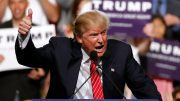- By Gio Romano
Germany | Merkel’s government collapses

Advertise here from only ORM 100 [$275 USD]

Al-Sahawat Times | Ethical Global News from Oman and UAE | Donate HERE
German Chancellor Angela Merkel’s bid to form a new government fell apart, throwing the future of Europe’s longest-serving leader into doubt and potentially pointing the world’s fourth-biggest economy toward new elections.
The euro took a dive on the news this morning.
A month of exploratory coalition talks ended in a dramatic collapse just before midnight Sunday as a dispute over migration policy led the Free Democratic Party, one of the prospective partners, to walk out on a deal.
After 12 years in office that have made her Europe’s anchor of stability in times of crisis, Merkel said she’s staying on as acting chancellor and will consult with Germany’s president later today (Monday) on what comes next.
The collapse signals the limit of her pragmatic, non-ideological style of governing and leaves her options for staying in power for another four years dramatically narrowed.
“It’s a day at the very least for a profound examination of Germany’s future,” Merkel, 63, told reporters after the talks ended. “As chancellor, as caretaker chancellor, I will do everything to make sure this country continues to be well governed through the tough weeks ahead.”
Possibilities now include setting up a minority government headed by the religious, Christian Democrats bloc or asking President Frank-Walter Steinmeier to order a national election just months after the last one in September.
Both scenarios would be uncharted territory for Germany, which has had only eight chancellors in the seven decades since World War II.
Europe’s dominant nation is frozen on the global stage, affecting everything from policy toward the European Union, Turkey and Russia to government spending and cuts in carbon emissions.
Merkel already has made it clear that Germany’s euro-area policy is on hold until there’s a new government.
The euro fell 0.6 percent, the most in three weeks, to trade at $1.1739 at 07:45 in Berlin.
“A chance has been missed to go beyond ideological boundaries and agree realistic solutions,” Eric Schweitzer, head of Germany’s DIHK chamber of industry and commerce, told the Deutsche Presse-Agentur newswire. “But the DIHK is confident that all responsible parties will ultimately be capable of finding sensible compromises.”
Merkel’s biggest setback since she first won the chancellorship in 2005 follows unusually contentious exploratory talks. Policy disagreements on immigration, climate and energy proved so entrenched that even Merkel, once dubbed “the queen of the backrooms,” couldn’t bridge them.
FDP chairman Christian Lindner said the draft agreement to enter into formal coalition talks was riddled with “countless contradictions.” Lindner has called for a “turnaround” plan for Germany’s economy with larger cuts in income taxes and more business-friendly approach.
The FDP also wants to allow countries to leave the euro in an orderly way without quitting the EU.
“The topic was: is the overall direction right, do we have a common vision of what kind of policy should be done in this country over the next four years?”
Nicola Beer, Free Democrat general secretary, said on ZDF television on Monday. “On the big questions, there were no concessions” from the other parties.”
Disagreements about limiting migration to Germany dogged the exploratory talks from the start. It’s a measure of the fallout from Germany’s last election, which saw the right wing, anti-immigration, Alternative for Germany party enter parliament with 12.6 percent of the vote while Merkel’s bloc declined to its lowest share since 1949, marking the rise in far right elected parliamentary representation inn germany for the first time since the 1930s.
Many former voters of the CDU and its Bavarian CSU sister party switched allegiance to Alternative for Germany, which ran against the political establishment and Merkel’s liberal asylum policy in particular.
During last summer’s election campaign, the chancellor defended her open-borders stance during Europe’s refugee crisis in 2015 and 2016, saying she’s convinced she did the right thing.
Merkel could still turn for support to the Social Democratic Party, the junior partner in her last government since 2013, though SPD leaders insist they aren’t interested in another alliance after the party fell to its worst electoral defeat since World War II in September.
This story is available on:
APPLE NEWS | GOOGLE NEWS | AL-SAHAWAT TIMES
Talk to a journalist:
Email: NewsDesk@alsahawat.com
Web: alsahawat.com
Twitter: @alsahawat_times
G.Romano@alsahawat.com
Views: 0






